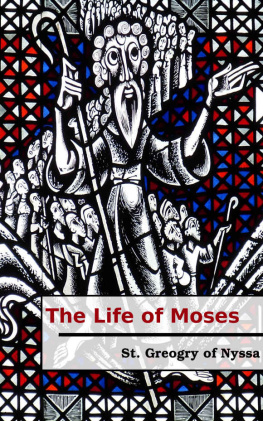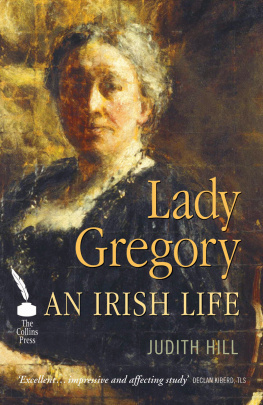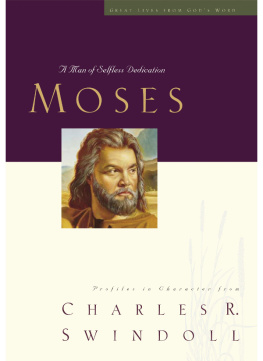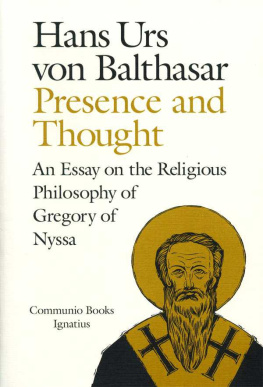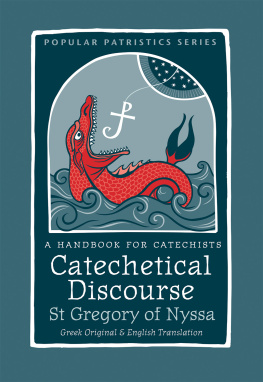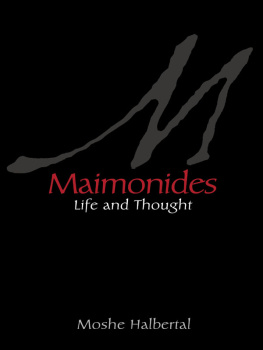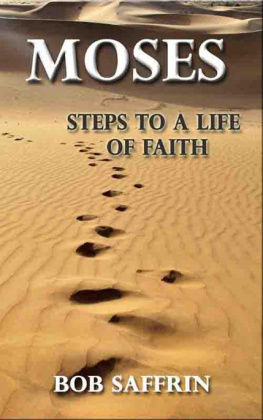Gregory of Nyssa - The Life of Moses
Here you can read online Gregory of Nyssa - The Life of Moses full text of the book (entire story) in english for free. Download pdf and epub, get meaning, cover and reviews about this ebook. year: 0, genre: Religion. Description of the work, (preface) as well as reviews are available. Best literature library LitArk.com created for fans of good reading and offers a wide selection of genres:
Romance novel
Science fiction
Adventure
Detective
Science
History
Home and family
Prose
Art
Politics
Computer
Non-fiction
Religion
Business
Children
Humor
Choose a favorite category and find really read worthwhile books. Enjoy immersion in the world of imagination, feel the emotions of the characters or learn something new for yourself, make an fascinating discovery.
- Book:The Life of Moses
- Author:
- Genre:
- Year:0
- Rating:3 / 5
- Favourites:Add to favourites
- Your mark:
- 60
- 1
- 2
- 3
- 4
- 5
The Life of Moses: summary, description and annotation
We offer to read an annotation, description, summary or preface (depends on what the author of the book "The Life of Moses" wrote himself). If you haven't found the necessary information about the book — write in the comments, we will try to find it.
The Life of Moses — read online for free the complete book (whole text) full work
Below is the text of the book, divided by pages. System saving the place of the last page read, allows you to conveniently read the book "The Life of Moses" online for free, without having to search again every time where you left off. Put a bookmark, and you can go to the page where you finished reading at any time.
Font size:
Interval:
Bookmark:
St. Gregory of Nyssa

Material compiled from Toronto, Ontario, Canada
April, 2017
publishingtoronto@gmail.com
The spectators at the horse races, being deeply engrossed in winning, shout to their favorites in the competition, despite the fact the horses are earnest to run on their own.In the stadium they are involved in the race only with their eyes, hoping to motivate the charioteer to a greater effort and at the same time inciting the horses forward while bent forward, waving their arms like a whip and stretching out their their hands.They perform these things, not because they believe their behavior can help with the victory, but thinking that at the very least, by this manner, and by their good intention, they can enthusiastically demonstrate both in voice and deed their concern for the contestants.I suppose I am doing this same thing, my most precious friend and brother.During the time you are honorably competing in the godly contest on the track of virtue, lightly running and straining regularly for the reward of the heavenly calling, I will simply goad, encourage and urge you to forcefully increase your pace.I do these things, not being moved to it by any great impetus, but rather to indulge the joy of a beloved child.
Because the epistle which you sent recently, petitioned us to give you advice about the perfect life. I consider it only fitting to reply to your appeal.Even though there may be nothing profitable for you in my writings, perhaps this demonstration of quick obedience will be of benefit to you.Because we, who were ordained to the office of father over so many lives, should think it only fitting that here in our old age we should welcome a task from the younger ones. And how much more fitting is it, since we have instructed you, a young men, to be obedient, that we should do the same so that the correct action of quick obedience is established in you.
Enough of this.We must commence the chore that is set before us, having God as our leader in our discourse.My dear friend, you asked that we give an outline to you as to what the perfect life looks like.Your purpose obviously was to transfer the grace revealed in my words into your own soul, if you were able to find in my discourse what you were looking for.However I am wanting in two matters: I am unable to fully describe perfection in my discourse and I am not able to demonstrate in my own life the foresight required of such a discourse.And it may be that I am not alone in this matter.There are many splendid men who do very well in virtue and will concede that for them such an achievement is impossible.So that I would not seem, in the phrase of the Psalmist to quake for fear where no fear is present, I will put before you plainly what I think.
The perfection of all things which can be defined by our senses is constrained by certain fixed limits.A set quantity, for instance, allows for both continuity and boundaries, because measurement is marked off by certain boundaries fitting for itself.The one who gazes upon a cubit or at the number ten understands that perfection is the result of the fact that there is a start and an end.However with virtue we have come to know from the Apostle that the only boundary of perfection is that it possesses no boundary.We know this because that divine Apostle who had such noble and elevated wisdom, who was always running the race of virtue, never stopped pushing forward towards those things that are coming.To cease running was not a secure course for him.Why is this? This is because goodness does not innately have a limit, but is rather bound only by the existence of the opposite. In the same way that life is bound by death and light is limited by darkness.And all good things usually finish with all those things which are seen to be opposed to what is good.
For in the same way that the start of death is the end of life, so too ceasing from the contest of virtue marks the start of the course of wickedness.So our statement is true, that taking hold of perfection with regard to virtue is not possible, because it has been shown that what is limited by boundaries it not righteousness. itself
I claimed that it is impossible for those who strive for the life of virtue to achieve perfection.The sense of this will now be expanded upon.
The Godly One is truly good, in the truest sense of the word, and his very essence is righteousness.And so he is thus called, being known by his essence.Because it has not been shown that there is boundary to goodness except wickedness, and since the Divine does not yield to the opposite, we claim that a godly nature is unbound and infinite.Truly whosoever chases after genuine virtue shares in nothing else but God, because he alone is full of virtue.And so those who understand what is upright by nature yearn to share in it. And because virtue has no boundary, the yearning of the sharer by necessity does not cease, but stretches out to the infinite.
So it is then certainly impossible to achieve perfection, since, as I have related, perfection is not demarcated by any boundaries. The only boundary for virtue is the lack of a boundary.But how could one reach the sought after limit when there is no limit?
Even though my entire argument has demonstrated that what is sought after is unreachable, one should not ignore the ordinance of the Lord which says, "Be therefore perfect, as your father in heaven is perfect."Because in the case of those things which are upright by their nature, even if knowledgeable men are not capable of achieving all things, by reaching even a portion they could achieve much.
We must now show great care not to stumble from the path of perfection which is achievable, but instead to possess as much of it as is possible. To this degree may we advance in the domain of what we pursue, because the perfection of our nature is made up of the increase of righteousness.
I thought it good to use Scripture as an adviser in this matter.Because the divine voice speaks through the prophecy of Isaiah. Think of Abraham your father and Sarah, who begat you.Those who stray away from virtue are rebuked by Scripture.In the same manner as the sea, those who are swept away from the course leading to the harbor correct their aim by a clear mark, looking for a lighthouse on high, or a certain mountain appearing. In the same manner Scripture by the example of Abraham and Sarah will direct us once more to the safe harbor of the divine will for those who have drifted out in the sea of life with a mind lacking a navigator.
People are separated into being either male or female, and the free-will choice of virtue or vice is put to them equally.On account of this the corresponding paradigm for an upright life for each gender has been put forth by the heavenly voice, so that each one, but looking to the one which he is like, i.e. the men to Abraham and the women to Sarah, will be set on the right course of virtue by their respective examples.In this way the recollection of these notable lives should be sufficient to fill our need of a lighthouse and demonstrate to us how we are able to direct our soul to the safe harbor of virtue where it does not have to spend the winter beset by the storms of life and be shipwrecked in the deep waters of wickedness by the constant violent winds of the passions.It may be for this purpose that the daily life of those magnificent people is described in detail, so that by copying their earlier righteous examples those who come after them may direct their lives to that which is better."But how?" Someone will say, "How will I copy them, since I am not a Chaldaean, which I recall Abraham was. I was not fed by the hand of the daughter of the Egyptian as is related by Scripture concerning Moses. Generally I do not have in these affairs anything from my life that matches up with those ancient ones. How will I put myself at the same level as them when one is cast out from the life of righteousness by dwelling in Egypt or in Babylon. God has not been known to honor those in Judea only, or Zion as people often suppose.We require some subtle wisdom and a good eye to distinguish between the times of old and now, but taking ourselves away from the Chaldaeans and Egyptians and by fleeing from those in Babylonian captivity, we will set out on the holy life.
Font size:
Interval:
Bookmark:
Similar books «The Life of Moses»
Look at similar books to The Life of Moses. We have selected literature similar in name and meaning in the hope of providing readers with more options to find new, interesting, not yet read works.
Discussion, reviews of the book The Life of Moses and just readers' own opinions. Leave your comments, write what you think about the work, its meaning or the main characters. Specify what exactly you liked and what you didn't like, and why you think so.

